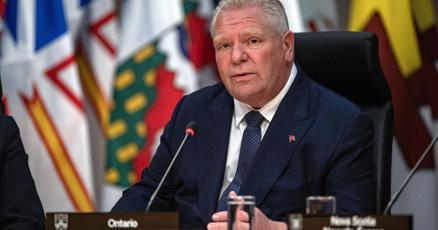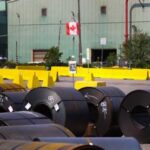As I look out over the Queen’s Park lawn this crisp Tuesday morning, the flags are snapping in the wind – much like Premier Doug Ford’s increasingly sharp rhetoric toward Washington. Yesterday’s announcement that Ford will head south of the border next week marks his second diplomatic mission in three months aimed at combating President Trump’s aggressive tariff policies.
“Ontario isn’t just going to sit back while our manufacturers and farmers pay the price for political games,” Ford told reporters at a Milton manufacturing plant yesterday. His voice carried that characteristic blend of neighborhood defender and business advocate that’s become his calling card in these trade disputes.
The premier’s upcoming Washington trip follows his March visit where he met with governors from Michigan, New York and Ohio – states whose economies are deeply intertwined with Ontario’s $400 billion in annual cross-border trade. This time, Ford’s team indicates he’ll be pushing harder on the automobile manufacturing sector, which employs roughly 100,000 Ontarians directly and supports nearly three times that number in related industries.
What makes this diplomatic push notable is how it positions Ford as perhaps Canada’s most vocal sub-national leader on trade issues. While Prime Minister Trudeau navigates federal relations with the White House, Ford has carved out a role as Ontario’s trade defender-in-chief.
“I’ll talk to anyone who’ll listen,” Ford said. “These tariffs hurt American workers just as much as they hurt ours. The auto parts crossing the border between Michigan and Windsor sometimes make the trip six times before a vehicle is finished.”
The numbers back him up. Data from Statistics Canada shows Ontario exported $187.4 billion in goods to the U.S. last year, with automotive products accounting for roughly a quarter of that total. Trump’s proposed 25% tariff on Canadian-made vehicles would devastate communities like Oshawa, Windsor, and Brampton.
Peter Shurman, former Ontario MPP and economic analyst, tells me Ford’s approach reflects political necessity as much as economic urgency. “Ford knows his re-election chances in 2026 are tied to Ontario’s economic performance. If these tariffs stick, the manufacturing job losses would be devastating to communities that form his political base.”
Ford’s latest diplomatic push comes as his government releases a report suggesting Trump’s tariffs could cost Ontario up to 65,000 jobs. The study, conducted by the Ontario Ministry of Economic Development, paints a stark picture of communities that would be disproportionately affected – particularly in southwestern Ontario where automotive manufacturing forms the economic backbone of many small and mid-sized cities.
I spoke yesterday with Jenna Williams, who operates a third-generation auto parts supply company in St. Catharines. Her 86-employee operation makes specialized components that cross the border multiple times during production.
“These tariffs would kill us,” Williams told me as we walked through her factory floor. “We’re not talking about adjusting or belt-tightening. We’re talking about whether businesses like mine survive at all.”
What sets Ford’s approach apart from previous provincial responses to trade disputes is his willingness to bypass Ottawa. While working in coordination with federal officials, Ford has established direct relationships with state governors and key congressional representatives from border states – relationships he cultivated during his first term.
Flavio Volpe, president of the Automotive Parts Manufacturers’ Association, sees Ford’s direct diplomacy as essential. “The American system responds to constant pressure. Having Premier Ford making Ontario’s case directly to decision-makers in Washington creates another front in this fight,” Volpe explained in a phone interview last week.
The premier’s office confirms he’ll meet with members of the Congressional Auto Caucus and representatives from border states where Canadian trade supports millions of American jobs. His team has carefully avoided criticizing the federal government’s parallel efforts but clearly believes Ontario needs its own voice.
Ford’s mission comes amid growing concern that the initial Canadian response to Trump’s tariff announcements lacked urgency. A recent Angus Reid poll showed 68% of Ontarians believe the federal government should be doing more to fight the tariffs, with 57% supporting Ford’s direct diplomacy approach.
In Windsor, where nearly one in five jobs connects to cross-border trade, Mayor Drew Dilkens expressed support for Ford’s mission. “Every voice matters in this fight. Having the premier directly making our case reminds American lawmakers that real communities and real families are caught in the crossfire of these trade disputes.”
What remains unclear is whether Ford’s personal diplomacy can move the needle in Washington. Trade experts I’ve spoken with express skepticism about changing Trump’s position but suggest Ford’s efforts could help secure exemptions or modifications that might soften the blow.
“The goal isn’t necessarily to eliminate the tariffs entirely,” explains Maryscott Greenwood of the Canadian American Business Council. “Success might look like carve-outs for certain products or extended implementation timelines that allow companies to adapt.”
For Ford, the political calculus is straightforward. By positioning himself as Ontario’s defender against external threats, he taps into a populist streak that has served him well politically. Yet the economic stakes transcend politics – these tariffs threaten the integrated supply chains built over decades since the Auto Pact of the 1960s.
As I watch workers change shifts at the Oakville Ford plant this afternoon, the human dimension of these trade disputes comes into focus. These aren’t just abstract policy debates but decisions that will determine whether communities across Ontario continue to thrive.
Ford’s message to Washington next week will likely echo what he told me during an interview last month: “This isn’t about politics. This is about people’s livelihoods, about communities that depend on these jobs, and about a trading relationship that benefits both our countries.”
Whether that message resonates in Washington remains to be seen. But for Ontarians watching nervously as trade tensions escalate, having their premier visibly fighting for their interests provides at least some reassurance in uncertain times.






